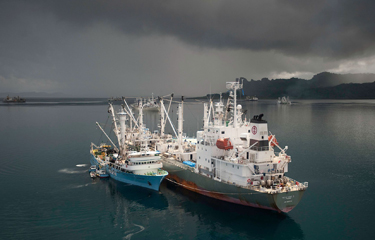Thai Union partners with The Nature Conservancy on anti-IUU initiative

Thai Union has committed to full transparency in its international tuna supply chain by 2025.
The Bangkok, Thailand-based seafood company, which notched more than USD 4.1 billion (EUR 3.3 billion) in revenue in 2019, signed a partnership with The Nature Conservancy on Wednesday, 3 March, committing to full supply-chain transparency across its global tuna supply chains.
The move will require Thai Union to install electronic monitoring on all of its partnered fishing vessels in their supply chains, including onboard video cameras, GPS, and sensors to automatically track activities onboard. These requirements may be substituted or augmented by human observers, it said in a press release. Thai Union has also pledged to implement a fish-aggregating device (FAD) management plan that mitigates environmental risks posed no later than 2025.
The commitment “has the potential to push the entire industry in a more sustainable direction by addressing widespread illegal, unregulated, and unreported (IUU) fishing practices,” according to The Nature Conservancy.
"We are very excited about the potential of this partnership to shift the sustainability needle across the entire canned seafood sector,” The Nature Conservancy CEO Jennifer Morris said. “Consumers and retailers send powerful signals when they choose sustainable products, and TNC hopes this commitment will catalyze rapid growth in electronic monitoring and transparency in fisheries all over the world."
The partnership between the environmental non-governmental organization and Thai Union also calls for the two entities jointly pushing governments, regulators, and supply chain actors to encourage greater monitoring of other fisheries in which Thai Union is involved, including European wild caught sprat, mackerel, herring, and whiting.
The Nature Conservancy said Thai Union’s commitment was “significant and timely,” given the ongoing suspension of onboard observer coverage in the fishing area managed by the Western and Central Pacific Fisheries Commission. Despite that, the NGO said fishing effort has only decreased by 4 percent during the COVID-19 pandemic while demand for canned tuna has surged, resulting in a 41 percent increase in wholesale tuna prices over the past year.
"Electronic monitoring creates transparency critical to consumers having confidence that their seafood products have been harvested legally, sustainably, and without labor abuses,” The Nature Conservancy Large-Scale Fisheries Program Director Mark Zimring said. “Effective monitoring contributes vital data, the current absence of which makes regulation of even the most vulnerable fisheries difficult. By partnering with one of the biggest players in the seafood supply sector to plug this data gap, Thai Union and TNC have a real chance to achieve durable change at a global scale."
In their joint statement, Thai Union and The Nature Conservancy said better fisheries monitoring will help reduce illegal, unreported, and unregulated (IUU) fishing, overfishing, and bycatch of sharks and turtles.
"Thai Union has made significant strides in making sustainability a key attribute of our company, from the creation of our global sustainability strategy, SeaChange, to partnering with leading organizations like The Nature Conservancy,” Thai Union President and CEO Thiraphong Chansiri said. “We understand that change does not happen in a vacuum; It is through collaboration and partnership that we shape the future. Change takes more than a wish and well-crafted words – those that are in a leadership position must define the path forward through actions and results. I look forward to the sustainable future Thai Union and TNC can help create through increased electronic monitoring and transparency throughout the seafood industry."
Photo courtesy of Nick Hall/The Nature Conservancy






Share